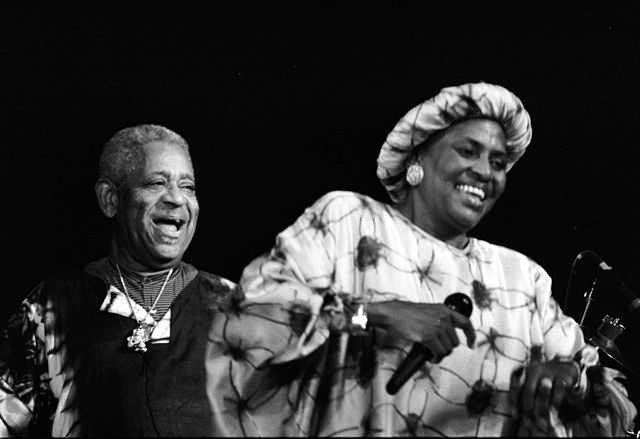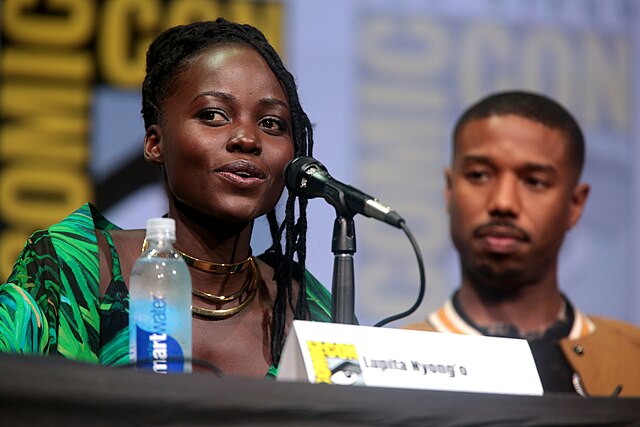Miriam Makeba’s songs are still popular, 16 years after her passing. She was one of her generation’s biggest voices and her lasting legacy is a testament to her work. Makeba’s songs advocated for social and political change.
As a result, the South African singer received the highest honors, becoming the first African to win a Grammy Award. Fondly referred to as Mama Afrika, she paved the way for black women and used her platform to influence change. Here’s a list of her songs.
Become an insider. Subscribe to our newsletter for more top trending stories like this!
People Also Read: 7 Vybz Kartel’s Songs You’ve Probably Heard But Didn’t Know the Artist Behind the Mic
Aluta Continua
Aluta continua is a popular phrase meaning the struggle continues. This is another one of Miriam Makeba’s songs that advocated for the end of the apartheid regime. She spoke against its injustices, calling for an end to the practice. Aluta Continua helped to mobilize the anti-apartheid movement. The song symbolizes the need to fight for justice and equality.
Africa Is Where My Heart Lies
Miriam Makeba expressed her love for Africa in the song Africa Is Where My Heart Lies. She celebrated the continent and shared her deep connection with it. She looked at the spiritual and emotional bond she’s experienced in Africa. This is the song you should play if you want to demonstrate your love for Africa.
People Also Read: Here Are Black Cowboy Movies to Watch Over the Weekend
Check out these musical keyboards on Amazon.
Amampondo
Amampondo is a song that celebrates the Zulu culture. She popularized it with her powerful vocals and is one of her greatest hits. It’s a demonstration of the spirit of Zulu culture.
Join our Spotcovery Global Black Community Facebook Group for early access to exclusive content and to share in a lively discussion.
The Click Song (Qongqothwane)
Makeba uses the Xhosa click in this song. It’s one of the most popular languages in South Africa. A group of singers and soloists perform the song which is also accompanied by percussion instruments. The Click Song portrays the story of a woman asking her suitor if he wants to marry her.
People Also Read: Morgan Heritage: 7 Best Songs for Your Every Mood
There are many musical instruments on Amazon.
Umqokozo
This is an upbeat song that celebrates the love of dancing and community. A group of singers perform the tune and traditional instruments like drums, whistles and rattles are used. It’s an appreciation for life. The song is mostly used in weddings and other celebratory occasions.
Ntyilo Ntyilo
Miriam Makeba popularized Rethabile Khumalo’s song Ntyilo Ntyilo. The song is about a bird that flies away and the singer asks it to deliver a message to their loved ones. This song helped introduce Xhosa music to the world.
Become an insider. Subscribe to our newsletter for more top trending stories like this!
Get musical books on Target.
Pata Pata
Pata Pata is a song that encourages listeners to dance. Makeba sang it in isiZulu, describing a dance called Pata Pata. The song was produced in 1957 and became one of her hit songs. It’s a classic among South Africans showing their love for music and dance.
Get a quality guitar on Amazon.
Mbube
Mbube which means lion sleeps tonight. captures the mysterious nature of the African wilderness. The song has been performed by several artists, but Makeba’s rendition is one of the most popular. It celebrates the rich culture and diversity of African people.
Have you been looking for vinyl records? You can get them on Target.
Malaika
Malaika is a timeless hit that still reverberates through the African continent. Malaika is a Swahili word for Angel, a romantic song that tells the song of a man who is in love with a woman he’s unable to marry because he’s poor. Even so, he promises to cherish her. Its gentleness is one of its appealing qualities.
Lakutshn Ilanga
This is one of the most poignant Miriam Makeba’s songs. She captured the suffering of South Africans under the apartheid regime, stating that they couldn’t wait for better days. The song was a symbol of the most painful time in South African history. It’s a reminder of the country’s journey and why it needs to stay peaceful.
These are 10 Miriam Makeba’s songs that underline her legacy. She used her platform to fight for the rights of South Africans and the people at large. Miriam Makeba is an irreplaceable voice and for the time she lived, used her voice for the betterment of the world.
Nearly 80% of consumers visit directories with reviews to find a local business. List your business for free in our exclusive Spotcovery Black-Owned Business Directory.
Spotcovery offers unique and fresh daily content on Black culture, lifestyle, and experiences. We talk about everything black, black people, black-owned and black-owned businesses. We also deliver authentic and relevant content that will inform, inspire, and empower you! The future of black media is critical to today’s black experience! Our primary audience includes African Americans, Africans, Afro-Caribbean, and people of African heritage. Black culture is for the culture!
Become an insider. Subscribe to our newsletter for more top trending stories like this!





